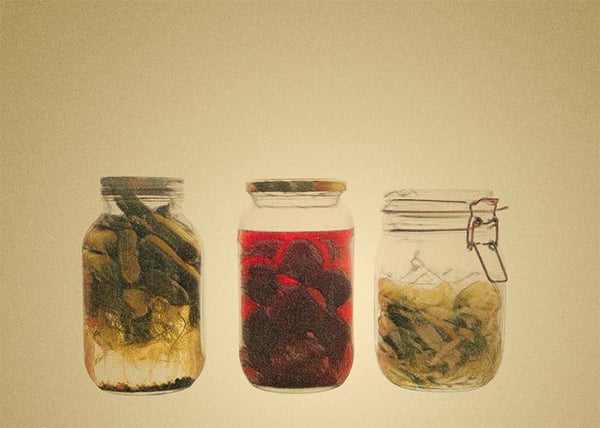A barrel of sauerkraut against the food crisis
An age-old food hack might help feed the future.
Let me tell you a story about my grandma's barrel of sauerkraut. My family used to have regular Saturday sauna evenings at my grandparents' magical countryside house in Latvia. But every autumn, someone else joined the ritual: the annual cabbage barrel.
It always turned up the same way: shredded cabbages, tightly packed into the barrel and tucked under cheesecloth. On top of that lies the same wooden plank every year, and finally, a cabbage-sized rock for weight. Beneath that rock, fermentation was doing its magic, sped up by the heat of the sauna.
Although it's had a cool, kombucha-flavoured revival in the 21st century in the West – especially since the pandemic, when people started exploring ways to make more sustainable and healthier food in home – fermentation is ancient and can be traced back over 10,000 years. Pottery from Neolithic China reveals traces of early brews of rice, honey and fruit. Kimchi has existed in Korea for at least 2,000 years; miso and soy sauce in Japan nearly as long. In Europe, apples didn't go to waste; they already became cider back in Roman times. Beer and wine – also fermented.
Fermentation is a microbial process where sugars are broken down by bacteria and yeast in the absence of sunlight or oxygen. In that sauerkraut barrel, for instance, bacteria feast on cabbage sugars, producing beneficial metabolites similar to those made by our own gut to digest food and protect our health. Because of this, research shows, sauerkraut may be much healthier than raw cabbage.
Other fermented foods have comparable health benefits, directly influencing the gut. On top of that, a lot of research over the past years has proven just how important a healthy gut microbiome (the combination of microbials in the intestines) is: it supports the immune system and fights inflammation, which influences everything from obesity and diabetes to neurodegenerative diseases.
Today, fermentation is part tradition, part movement. You might have that kombucha jar slowly fizzing away on a shelf. Perhaps you've tried sourdough or fermented cucumbers once or twice. It's such a forgiving process, ideal for reducing food waste in households. What most of us throw out – scraps like cores, peels, leaves, trims – fermentation can use as taste-builders. This part is explored in fermentation festivals and hubs all across Europe: testing flavours, exploring the limits of what can be fermented, and swapping jars and recipes.
But this goes beyond home kitchens. Just last month, the European Commission announced a strategy to fund fermentation technology research worth €350 million, casting it as a possible answer to many things from developing more sustainable food ingredients to biopesticides. In focus are technologies like precision and biomass fermentation. This means that besides making biopesticides and chemicals, fermentation could help produce things like proteins and fats without relying on animals or intensive agriculture.
The industry is growing fast. European fermentation companies raised €164 million in the first half of 2024 – surpassing the total €100 million raised in all of 2023. One NGO, the Good Food Institute, estimates that Europe could eventually cover 50% of global protein production through fermentation.
Whether it's an annual sauerkraut barrel, a kombucha jar on a shelf, or a fast-growing industry, we are about to find out where the ancient practice of food can bring us in the future.

